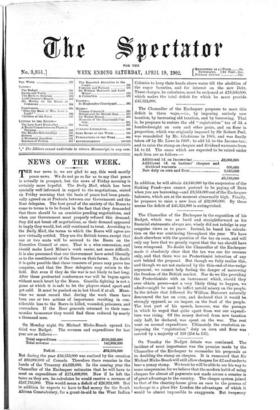The Chancellor of the Exchequer in the exposition of his
Budget, which was as lucid and straightforward as his financial statements always are, wisely did not indulge in any sanguine views as to peace. Instead, he based his calcula- tion on the war continuing throughout the year. We have dealt elsewhere with the question of the tax on corn, and will only say here that we greatly regret that the tax should have been reimposed. No doubt the Chancellor of the Exchequer made it absolutely clear that the tax was one for revenue only, and that there was no Protectionist intention of any sort behind the proposal. But though we fully realise this, and though we are not enslaved by the thin-end-of-the-wedge argument, we cannot help feeling the danger of narrowing the freedom of the British market. Nor do we like providing the Protectionists with an instrument which, should they ever obtain power—not a very likely thing to happen, we admit—might be used to inflict untold misery on the people. In the debate that followed Sir William Harcourt naturally denounced the tax on corn, and declared that it would be strongly opposed, as an impost on the food of the people. The beat part of his speech, however, was the passage in which he urged that quite apart from war our expendi- ture was rising. Of the money derived from new taxation only half, he declared, was spent on the war. The rest went on normal expenditure. Ultimately the resolution re- imposing the "registration" duty on corn and flour was carried by a majority of 119 (254 to 135).










































